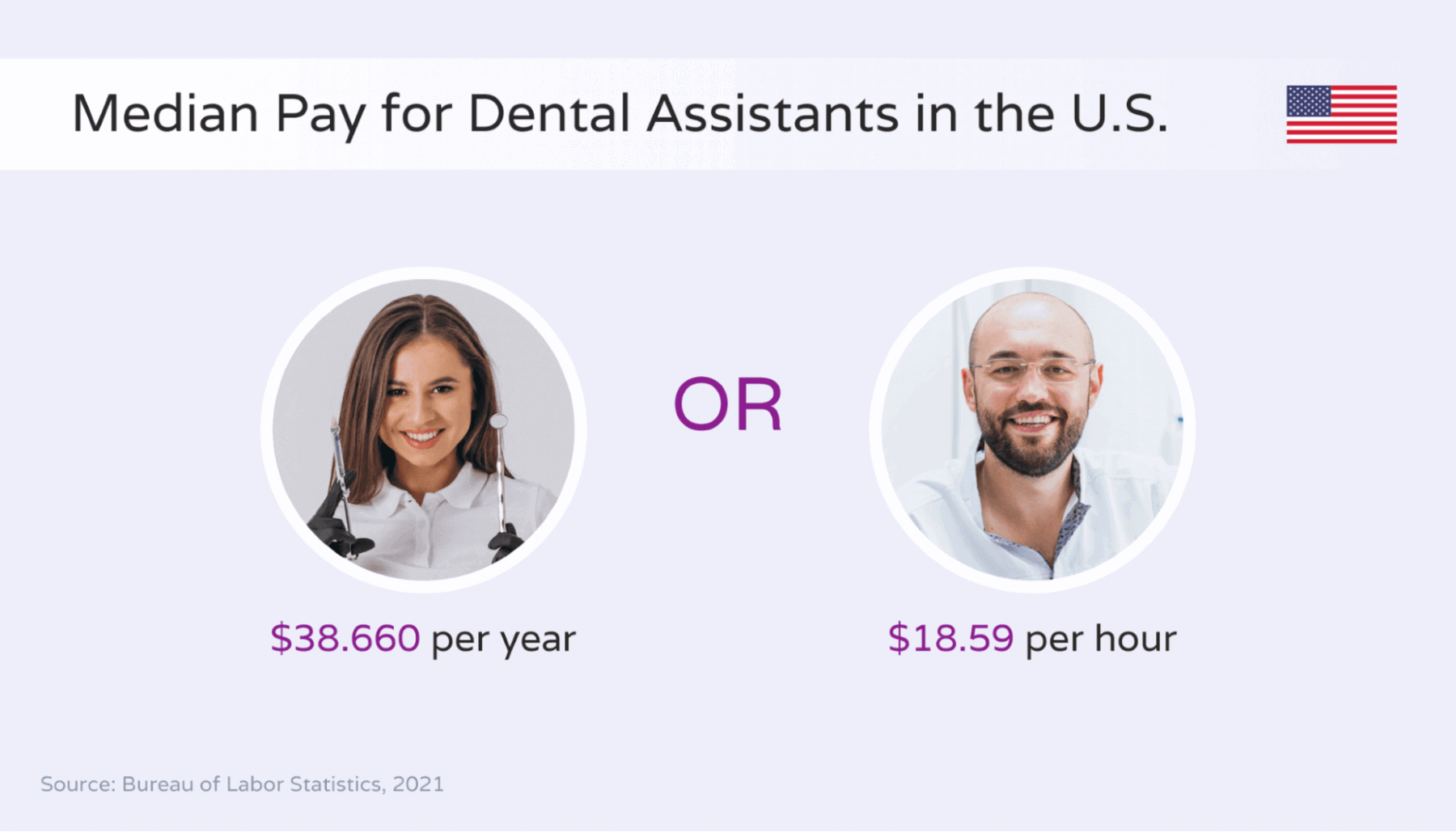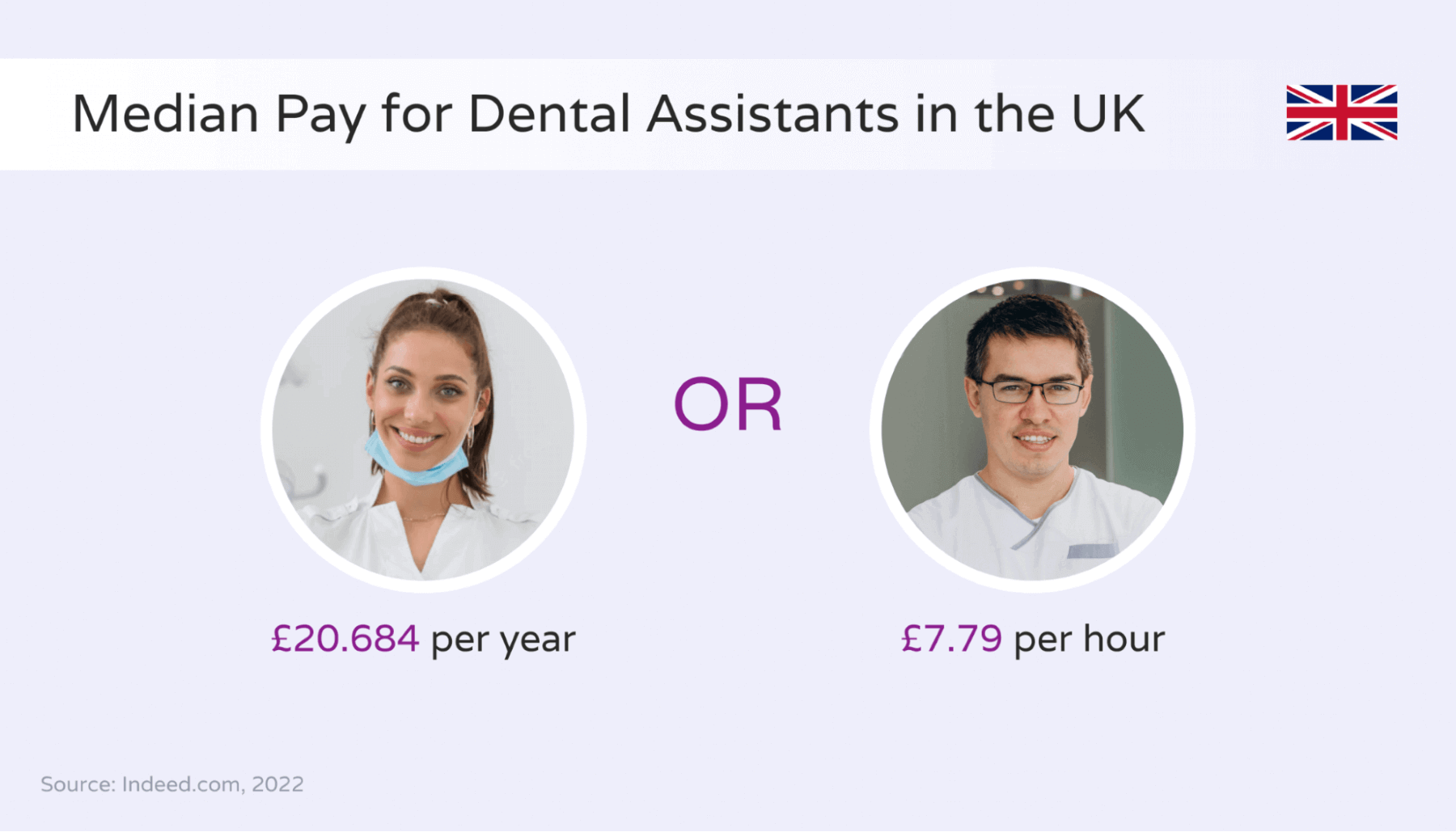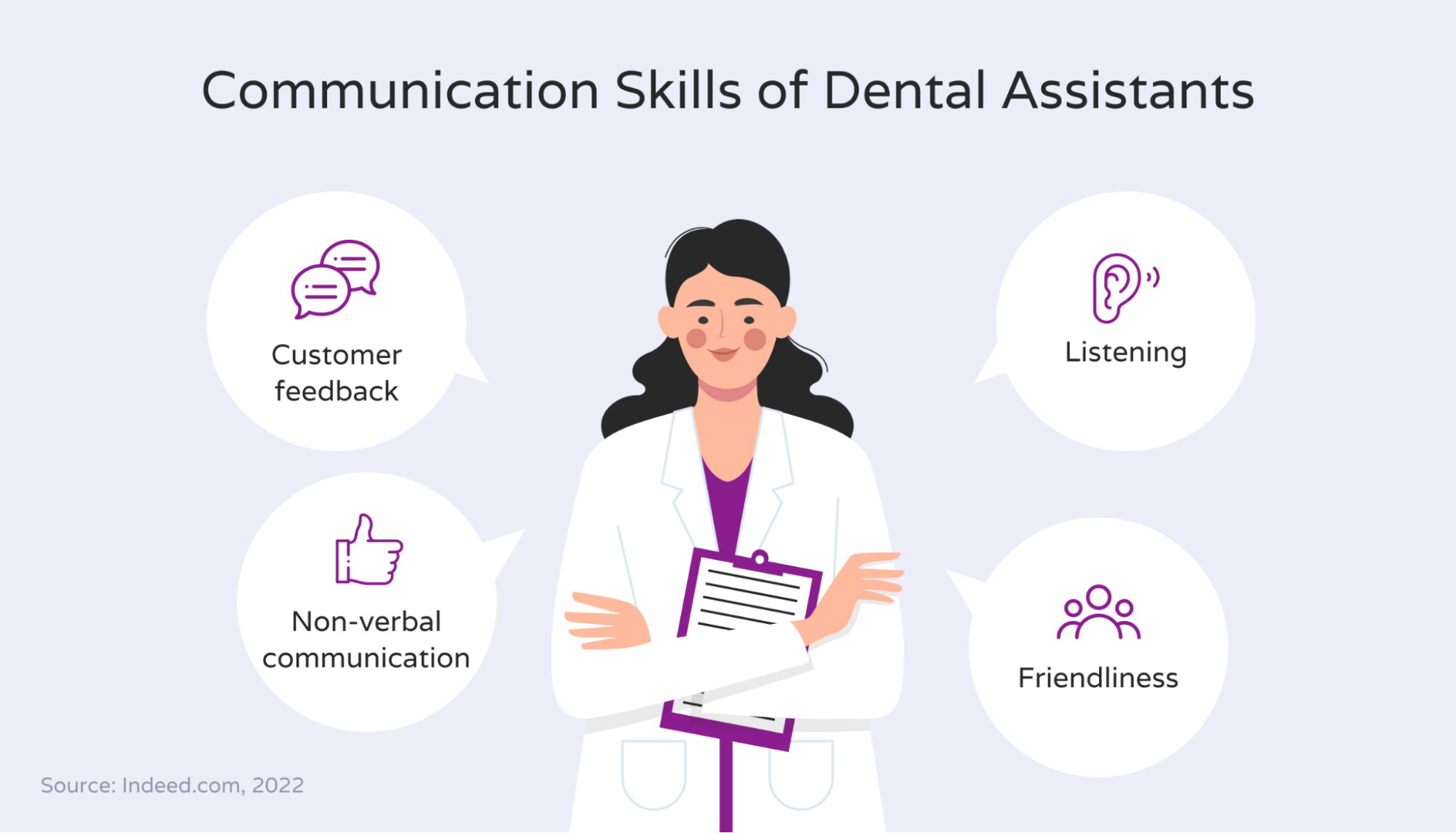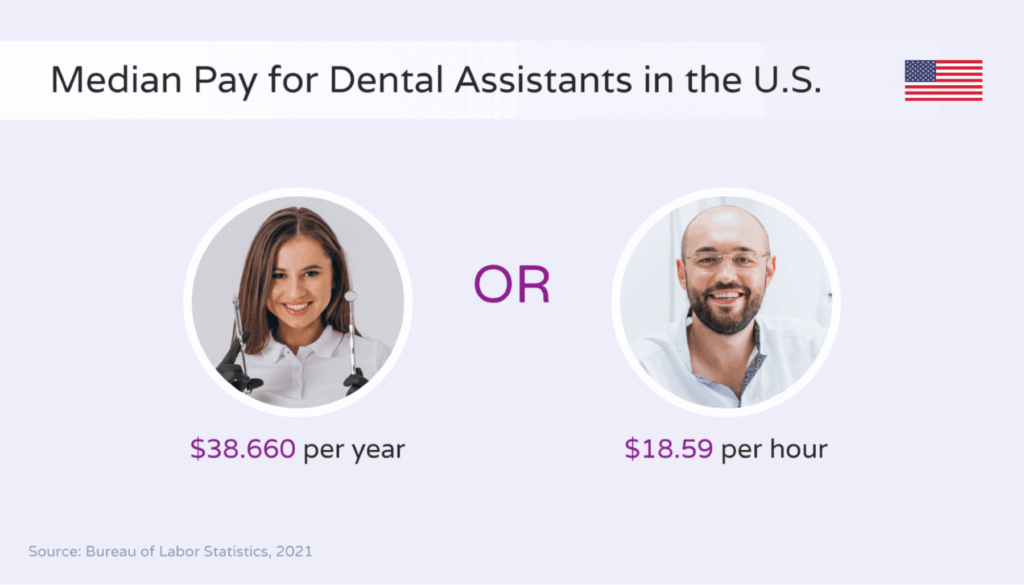Running a dental practice can be tough while juggling mundane tasks throughout the day.
If you’re looking for a way to let your hair down and finally take a breath, then a dental assistant might just be the thing you need.
But, how much will a dental assistant cost? What are their responsibilities? Is it worth hiring one for your practice?
In this article, we’ll go into detail about everything you need to know about a dental assistant, including the benefits of having one, how much you need to pay for an assistant based on several factors, and which skills you need to look for during the hiring phase.
What are the responsibilities of a dental assistant?
Dental assistants are members of a dental team who provide assistance to dental operators in any way they need — usually by aiding them with their administrative tasks, helping them during procedures, and communicating with customers.
Typical tasks of a dental assistant include:
- Take and record vital signs
- Manage emails and spreadsheets
- Handle client calls
- Prepare tray set-ups for examinations and oral procedures
- Provide customers with post-procedure instructions
- Provide patient dental care and prevention education
- Record and maintain patient records
- Schedule patient appointments
- Take dental impressions
- Handle patient billing and payments
- Perform tooth whitening procedures
- Order dental supplies
Many of these tasks can be performed by virtual dental assistants.

If you’re interested in having a virtual dental assistant support your business, why not speak to the Hello Rache team? Get access to a virtual dental assistant that has all the proper foundational and HIPAA training to help your practice run smoothly so you can finally have more time for consultations and to spend with your family.
Benefits of having a dental assistant
Here are some of the main benefits of having a dental assistant.
Reduce admin workload
Running a dental practice can be a nightmare when paperwork starts to stack up due to all the new tasks and procedures having to be recorded consistently.
This often leads to in-house admin staff having to spend more time on menial tasks that provide little value to the growth of your practice.
Having an assistant who can handle those tasks means that your administrative staff has more time to focus on crucial tasks that could benefit your business.
Save time
Administrative tasks and customer service can take up a lot of time and get overwhelming quickly — especially if you’re juggling client appointments.
With the help of an assistant, you’ll be able to free up a lot of your time, and you won’t have to rush consultations and feel like your work-life balance is in chaos.
Many dental operators realize that having an assistant saves a lot of time, so it’s easy to understand why more dental practices are hiring these employees than ever before. The employment of dental assistants is predicted to grow by 11% from 2020 to 2030.

Increase productivity
Since some of the duties of dental assistants include things like managing your calls and emails, scheduling appointments, and doing data entry, your practice’s processes will run more smoothly with this type of support. In turn, this will lead to higher productivity.
Furthermore, with your workload lessened, you’ll free up resources you can use to work on strategies to grow your business.
Pay lower fees with a virtual assistant
As mentioned earlier, many of the tasks performed by office-based assistants can also be performed by virtual assistants. If you’re simply looking for someone to handle your administration and customer service tasks for you, a virtual assistant would be the perfect solution.
The great thing about virtual assistants is that they have a lower hourly rate, and you don’t have to buy additional equipment — which means you’ll be getting someone to take care of all your mundane business tasks while saving money at the same time. It’s a win-win!
How much do dental assistants make?
According to the Bureau of Labor, the median pay for dental assistants in the U.S. is $38,660 per year or $18.59 per hour.

However, the salary of a dental assistant varies based on the type of position, the employee’s level of experience and qualifications, and the location of your practice. Let’s have a look at these different factors.
Dental office assistant salary by location
Different locations greatly impact the salary or wage you’ll need to pay your dental assistant.
Dental assistant salary in the U.S.
While the mean wage for dental assistants is $38,766, different states have different wages, as seen below.

States with the highest dental assistant salaries include:
- Minnesota: $53,070 per year or $25.52 per hour.
- Massachusetts: $51,210 per year or $24.62 per hour.
- Alaska: $50,640 per year or $24.35 per hour.
- New Hampshire: $49,470 per year or $23.79 per hour.
- Oregon: $48,780 per year or $23.45 per hour.
In contrast, states including Idaho, Nevada, Utah, New Mexico, Arkansas, Louisiana, Mississippi, Alabama, West Virginia, Puerto Rico, and Hawaii have the lowest salary range from $19,200 to $38,020 per year.
However, aside from the state, you also need to keep the area in mind. Dental assistants in certain areas can earn up to $2,000 more per year.
Top-paying metropolitan areas include:
- San Francisco-Oakland-Hayward, CA: $55,150 per year or $26.51 per hour.
- Minneapolis-St. Paul-Bloomington, MN-WI: $55,020 per year or $26.45 per hour.
- San Jose-Sunnyvale-Santa Clara, CA: $54,590 per year or $26.25 per hour.
- Santa Rosa, CA: $52,550 per year or $25.27 per hour.
- Rochester, MN: $52,510 per year or 25.25 per hour.
- Barnstable Town, MA: $52,380 per year or $25.18 per hour.
- Boston-Cambridge-Nashua, MA-NH: $52,330 per year or $25.16 per hour.
- Bismarck, ND: $52,240 per year or $25.11 per hour.
- Fairbanks, AK: $51,940 per year or $24.97 per hour.
- Portsmouth, NH-ME: $51,110 per year or $24.57 per hour.
Top-paying nonmetropolitan areas include:
- Alaska nonmetropolitan area: $53,020 per year or $25.49 per hour.
- Northeast Minnesota nonmetropolitan area: $49,800 per year or $23.94 per hour.
- Massachusetts nonmetropolitan area: $49,660 per year or $23.87 per hour.
- Southeast Minnesota nonmetropolitan area: $49,480 per year or $23.79 per hour.
- Northwest Minnesota nonmetropolitan area: $49,080 per year or $23.60.
Dental assistant salary in the UK
The average wage for dental assistants in the UK is £20,684 per year or £7.79 per hour.

However, some assistants can earn up to £4,000 more per year based on their city. Here are some of the highest-paying cities in the UK:
- Birmingham: £25,056 per year or £9.43 per hour.
- Exeter: £25,051 per year or £9.43 per hour.
- London: £23,451 per year or £8.83 per hour.
- Manchester: £22,774 per year or £8.57 per hour.
- Walton-on-Thames: £21,863 per year or £8.23 per hour.
- Carmarthen: £19,779 per year or £7.45 per hour.
- Bristol: £19,297 per year or £7.27 per hour.
- Portsmouth: £19,220 per year or £7.24 per hour.
Dental assistant salary by experience, education, and skills
A dental assistant's salary or hourly wage can increase considerably based on their years of experience, level of education, and skill set.
Assistants with more than 10 years of experience earn nearly $6 per hour more than dental assistants with 1–2 years of experience.

Similarly, assistants who have certain qualifications earn more than those who don't. For example, assistants who have an EFDA Certification can earn 7.51% more, and Registered Dental Assistants earn 3.05% more on average.
Regarding skill sets, dental assistants with diagnosis and treatment planning earn up to 27% more. Those with inventory control can earn up to 16% more, and those with bill collection skills can earn up to 14% more — just to name a few.
Dental assistant salary by type of position
The type of dental assistant you hire can also greatly impact their salary or hourly wage. Office-based dental assistants, dental receptionists, and virtual dental assistants all have different earnings.
Office-based dental assistants
Since office-based dental assistants are required to come into the office, they have a higher hourly wage. The hourly rate for these types of employees starts at $17.36 per hour (for entry-level dental assistants with less than a year’s experience) and can move up toward $30 per hour based on their qualifications and skills.
Dental receptionists
Dental receptionists are responsible for greeting clients upon entering the office, answering client calls and questions, scheduling appointments, and performing basic administrative tasks. The average salary for this position is $18.23 per hour.
Virtual dental assistants
A virtual assistant performs all the tasks that a dental receptionist does. Additionally, if they have dental experience, knowledge, and qualifications, they can also provide clients with prevention education, postoperative instructions, and more.
With Hello Rache’s virtual dental assistants having a flat fee of $9.50, they are the ideal solution if you want an educated, well-trained virtual assistant who can help you with all your administrative tasks and more — without having to pay a fortune.
Additional costs to consider — aside from salary
In addition to paying a salary to an office-based employee, there are other costs to consider. Some of the most common benefits for office-based dental assistants and receptionists include:
- 401(k)
- AD&D insurance
- Dental insurance
- Disability insurance
- Employee discount
- Health insurance
- Life insurance
- Opportunities for advancement
- Paid time off
- Paid training
- Parental leave
- Prescription drug insurance
- Profit-sharing
- Retirement plan
- Tuition reimbursement
- Vision insurance
- And more
With a virtual dental assistant, you don’t have to worry about any of these additional costs.
What skills should you look for in a dental assistant?
Regardless of whether you’re thinking of hiring an office-based or virtual assistant, your assistant should have the following skills.
Communication skills
It’s vital for your dental assistant to have exceptional communication skills so that they can effectively communicate with you, your staff, and your clients.
Without good communication skills, your assistant won’t be able to provide excellent customer service — which could lead to clients walking out and finding a different dentist.
Your assistant needs to be able to listen when you or your clients speak, answer questions and give feedback, write good emails that provide value, and, most importantly, be friendly at all times.

Computer skills
Since the world is becoming more technologically advanced by the day, clients and businesses alike are performing many tasks online. Therefore, it’s crucial that your dental assistant knows their way around a computer.
They need to know email inside and out, have knowledge about computer applications such as Microsoft Office, know how to perform data entry, keep your social media pages up to date, and more.
Administrative skills
To improve your practice's productivity, your dental assistant needs to have excellent administrative and organizational skills. This way, your other staff members have more time to focus on time-sensitive, high-priority tasks.
Some of the most common administrative tasks include keeping data on track, scheduling appointments, handling patient billing, recording and maintaining patient records, and more.
Though there are many other skills that a dental assistant should have, the skills mentioned above are the most vital. This is because they provide the foundation for building additional skills to suit your practice and offerings perfectly.
What do similar professions get paid?
Want to compare salaries? Here are some other similar professions and what they’re earning on average per hour.
Orthodontic Assistant: Orthodontic assistants provide chairside assistance to orthodontists and make sure that patients are well-informed about procedures and braces aftercare. On average, they earn $20.17 per hour.
Sterilization Technician: A sterilization technician is responsible for preparing, sterilizing, assembling, and cleaning all healthcare or dental equipment for medical procedures, surgeries, or examinations. On average, they earn $17.08 per hour.
Dental Technician: Dental technicians manufacture dental prosthetics, such as crowns, dentures, bridges, and more. They create these devices by using impressions that dentists take of patients’ teeth. On average, they earn $19.71 per hour.
Treatment Coordinator: Treatment coordinators are responsible for assisting doctors, dentists, or other medical professionals in performing treatment procedures. They also perform administrative duties and discuss treatment plans with patients. On average, they earn $21.74 per hour.
FAQ
How much do dental assistants make in Indiana?
On average, dental assistants in Indiana earn $19.47 per hour or $64,185 per year. However, based on their experience level, this number can go up or down. For example, dental assistants in Indiana who have more than 10 years of experience earn $24.28 per hour, whereas those with less than one year’s experience earn $17.11 per hour.
How to recruit dental assistants?
The first step in recruiting a dental assistant is to decide what you’re willing to pay for the position so that you can set realistic expectations regarding the individual's skills and qualifications.
Next, you’ll need to source possible candidates through job postings, at dental staff recruitment firms, or by being on the lookout for new graduates.
After that, you’ll need to start the interviewing process by creating sample questions and asking all the necessary questions about each candidate’s experience, education, skills, and work availability.
After the interview, you need to determine if one (or more) of the candidates is suited for the position and decide whether you want to hire them.
Finally, once you’ve decided who you want to hire, you can start with the paperwork and make them an offer.
Or, if you’re looking to hire a virtual dental assistant, you can skip the entire process and simply book a call with our team, where we’ll find you the ideal virtual assistant for your practice.
Hire a virtual dental assistant today
When it comes down to it, having a dental assistant — whether it be an in-office or virtual assistant, will save you time and increase productivity.
Want to learn how you can make your practice run even smoother? Learn how virtual medical billing can help you achieve that.




